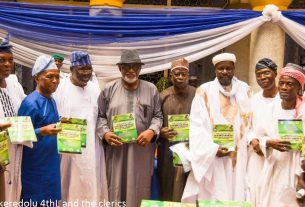As Ondo State clocks 44 years today, eminent citizens of the state have declared that the aims and objectives of agitating for the creation of the Sunshine state have been achieved, saying the state has grown in leaps and bounds.
Those who spoke include the National leader of Afenifere, Chief Reuben Fasoranti, former Secretary to the Government of the Federation, Chief Olu Falae and the pioneer Bishop of Akure Diocese of the Anglican Communion, Rt. Rev’d Bolanle Gbonigi .
They said the objectives of the creation of Ondo state from the old Western Region in 1976 have been met.
According to them, the clamour for having government nearer to the people was eventually achieved, and it is a thing of joy for everyone.
They emphasised that the objectives of the creation had been met in terms of growth, increasing number of good schools, school enrolment, improved infrastructural development, population growth, urban development among others.
However, they were of the view that there are rooms for improvement.
They equally insisted that, more attention should be given to youth employment, rural and urban roads rehabilitation, water supply and provision of electricity to ensure a better society.
In his appraisals, the elderstateman, Chief Fasoranti said that the desire to bring government nearer to the people led to the creation of Ondo State in 1976.
“Before that time, we were going to Ibadan for everything, for every request and the people felt it was too far away, then the agitation to have a government nearer to the people began.
Some leaders got together, people like Adamolekun, Akerele, and so on, put their heads together and put the agitation across that government should come nearer to the people.
“When the agitation became stringent and very loud, the government at the federal level had no choice than to accede to the request. That was how it came about.
“The significance of this creation was that government became closer to the people as demanded. It became very easy to make consultations and address problems. Now, we can tackle our problems and urgent steps and consultations can be quickly made to address urgent issues, which could not happen before the creation,” Fasoranti said.
He noted that successive administrations did their best to develop the state in the last 44 years, adding that all governors had listened to the agitations of people and respond appropriately to the situation at hand.
He encouraged leaders to continue to listen to the agitations of the people, and also look inwards to properly run the state.
On his part, Chief Olu Falae, a former Minister of Finance, disclosed that when the state was created, the people were very excited and looked forward to tremendous development of the State.
“The military administration started with virtually nothing, and then hurriedly put up some structures. At that time we had almost 50 secondary schools in and around Akure alone, which were more than the number of secondary schools in many States in the North.
”And this is how it should be, because education is the most important thing any government can give to its people. When the military left and UPN government of Chief Adekunle Ajasin came in, government made education totally free including tuition; books and writing materials. This was to make every child, either a child of pauper or millionaire, have access to education.
The former Secretary called on government at all levels to give some premium to job creation through skills acquisition, special training programmes, encouragement of private investors to address challenge of graduates unemployment in the society, noting that education without employment could be counterproductive.
“Even at this, enough has not been achieved. For example, it is a shame that there is no single city in Ondo, even in the whole of Nigeria, outside Abuja, that has a central sewage system. There is no water supply. Since December 20, 1979 that I moved into my house, no pipe borne water, I have been supplying my own water through well.
“No electricity. There is huge shortfall in the supply of electricity. Then on roads, in a modern society, there should be a good network of roads to facilitate movement of goods and people from the farms to the cities,” he added.
On his part, Bishop Bolanle Gbonigi advised the state government to make Internally Generated Revenue (IGR) their mainstay as it was when Ondo State was created in the year 1976.
He noted that at that time, emphasis was on internally generated revenue.
His words: “Then, in the villages and farmsteads, emphasis was on raising funds locally, so that government could have enough money to serve the people adequately”.
In this vein, Ondo State government was urged to build its internally generated revenue base by going beyond the urban areas into the interior and encourage those in the rural areas to also contribute their quota to building the internally generated revenue of the state.
Gbonigi stated that government needs to intensify efforts by sensitising the populace and make them see the need to contribute their quota to developing the state.
He said that since they all receive support in terms of security among other amenities from the government, the people must be encouraged to give.
He regretted that the citizens are sometimes discouraged from contributing fully, because of the fear that the money would be embezzled.
He urged the government to practice good politics where they listen to the people in order to rebuild trust that would bring about better relationship between them.
The Hope





